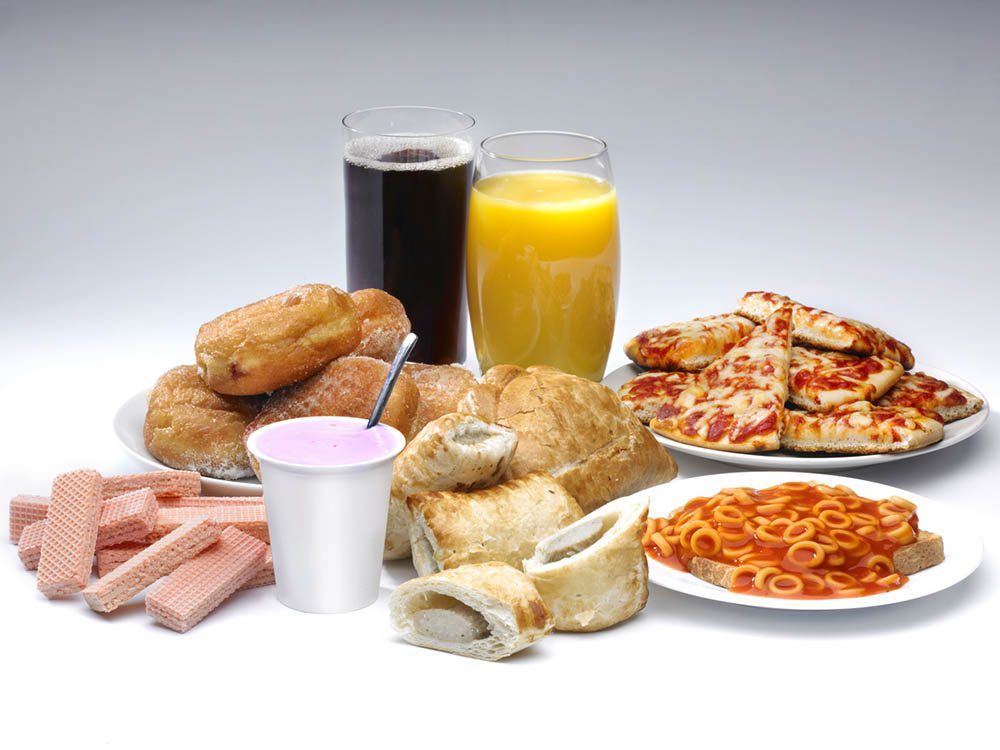If an indulgent Christmas and New Year has left you feeling bloated then we are here to help. Nutritional Director Rick Hay reveals four natural ways we can help bloating and how digestive enzymes can help too
There are many reasons why you may be suffering from a bloated belly, especially during this time of year where we all seem to be having too much of a good thing – chocolate, mince pies, alcohol. The list goes on.
However, we have some good news, Nutritional Director Rick Hay explains that there are some simple and easy steps we can take to alleviate our bloating issues.
Bloating fix #1 Don’t eat too quickly
Firstly you might want to slow things down whilst you’re eating, Hay explains. ‘Try not to eat too quickly as too much air can be swallowed leading to abdominal distension (bloating)’.
A 2009 study on ten participants with suspected aerophagia (that’s someone who swallows too much air) demonstrated that bloating and abdominal pain may be due to excessive air swallowing whilst eating.
Hay advises eating in a slow and relaxed way and making sure you are sat down and away from your desk, TV or any other type of screen.
Eating too fast or eating in front of a screen can send the wrong messages to your brain, so instead of producing digestive juices, enzymes or bile and stimulating contractions in our digestive tract – all of which help the digestive process along – your body is actually producing stress hormones and increasing brain activity to process the information coming from your surroundings.
‘The digestive process begins with our eyes, when we see food, our digestive system is then stimulated producing what is needed for the initial breakdown of our food,’ Hay asserts.
‘Therefore mindful and relaxed eating will help with digestive function as you are concentrating on the food itself and not a screen’.
Bloating fix #2 Stay hydrated
Staying hydrated can help with a flat tummy. When you’re dehydrated the body may hold onto water until the next time it is needed causing the dreaded water retention that can cause not only tummy bloating but also swelling in other parts of the body such as the ankles. Not staying hydrated can also lead to constipation and further digestive discomfort.
However, there is a caution here, and that is not to drink too much water with meals, Hay warns. ‘Drinking too much water with food may dilute stomach acid which we need for optimum break down of food,’ he explains.
‘Try sipping half a glass of water instead of gulping during meal times, but if you can, try not to drink too much at all while you’re eating,’ advises Hay.
Bloating fix #3 Avoid eating too much processed and sugary food (and don’t over eat)
Poor food choices that include overly processed and sugary food options will only make matters worse.
Processed and sugary foods often come hand in hand with additives, artificial colours, bulking agents, preservatives and artificial sweeteners which bombard our digestive tract and can lead to gut dysbiosis (bacterial imbalance) and lead to bloating – not to mention weight gain.
The sweetener sorbitol in particular should be avoided, as this is one of the main sweeteners that is difficult to digest with studies suggesting that a large number of adults could be suffering from sorbitol-induced abdominal symptoms and diarrhoea. Other sweeteners may also cause bloating too, including maltitol and fructose – so read the label carefully.
Food is a common trigger where digestive problems and symptoms are concerned and restricting certain foods can dramatically improve these problems and symptoms in some sensitive people.
A diet low in fermentable carbs known as a ‘low FODMAP diet’ is clinically recommended for the management of irritable bowel syndrome (IBS) or other types of bloating discomfort and there is a large body of scientific evidence sowing it can really help.
So what is the Low FODMAP diet?
The term FODMAP stands for ‘fermentable oligo-, di-, mono-saccharides and polyols’ which are scientific terms used to classify groups of carbohydrates that are known to trigger digestive symptoms like bloating, gas and stomach pain.
‘Food such as onions, lentils, rye, cabbage, broccoli, Brussels sprouts, beans and dried fruits are all high in FODMAPS so they’re poorly absorbed by the gut and as a result pass through and enter the colon where they are fermented by bacteria.
‘This leads to excess gas being produced that can cause cramping, bloating, wind and pain,’ explains Hay.
A 2016 study indicates that restriction of FODMAP foods is an effective dietary intervention for reducing IBS symptoms.
The randomized controlled trial found that the low FODMAP diet as well as taking probiotics had significantly improved IBS symptoms compared to those eating a normal diet.
‘Those who eat more FODMAP high foods have demonstrated prolonged hydrogen production in the intestine and colonic distension by fermentation,’ the authors said. ‘This has led to gas, bloating and stomach discomfort’.
So if you find yourself suffering from persistent bloating, a low FODMAP diet may help your symptoms improve.
Bloating fix #4 Keep a food and ‘feelings’ diary
Simple yet effective. Keeping a food dairy may help you to identify the foods that cause your bloating to worsen. By writing down what foods you eat you will start to learn which foods trigger you to bloat and when you have established what foods may be a cause for concern, you can try an elimination diet.
An elimination diet involves removing the foods from your diet that you suspect your body cannot tolerate. These foods are then later reintroduced, slowly and one at a time, while you look out for any symptoms of bloating to reappear.
But don’t just record the food you eat – include drinks, your water intake and even add any exercise you have done. ‘Overtraining or overexercising can have a negative impact on digestive function too. So make sure that you are not overdoing it when you exercise’, warns Hay.
Write down your feelings too as you may find that stress can worsen your symptoms of bloating and stomach discomfort. Evidence from clinical and experimental studies show that psychological stress (acute or chronic) can have a marked impact on intestinal sensitivity and bloating.
Bloating fix #5 Try a natural digestive enzyme
Digestive enzymes are substances produced by our bodies that help us digest and break down the foods we eat. Having all of our digestive enzymes working correctly is essential to healthy digestion and ensures the optimal absorption of nutrients from our food.
These enzymes help break down large macromolecules like proteins that are in the foods we eat into smaller molecules that our digestive system can then absorb.
As food travels through your digestive system, different enzymes break down specific food types. For example, lipase (produced by the gut) supports the conversion of fat into fatty acids and cholesterol, and amylase (also in the gut) is used in transforming carbohydrates into simple sugars.
If your body falters in producing any of these enzymes, the corresponding nutrients may not be absorbed as efficiently, which might impair digestion and lead to bloating.
While our body creates digestive enzymes in our saliva, pancreas and gut (small intestine) they can also be found in certain foods and supplements which can help the process of digestion along.
kiwi, papaya, bananas, avocado, mangoes and pineapple are rich in digestive enzymes
Some fruits and vegetables are excellent natural sources containing digestive enzymes including kiwi, papaya, pineapple, bananas, avocado, mangoes and pineapple.
Apple cider vinegar, sauerkraut, kimchi, miso, kefir, yoghurt and honey can help too as they’re also rich in digestive enzymes.
Sometimes it can be hard to keep up your good habits, meaning your digestive enzymes could be compromised. Supplementation with digestive enzymes may therefore give you an extra boost.
For example, you can supplement with digestive enzymes such as bromelain (from pineapple and papaya) and protease which help to break down protein we consume, lipase which helps to break down fat, and cellulase which helps to break down fibre. Such enzymes will help to break down food more efficiently lessening our chances of bloating and abdominal discomfort.
‘Taking digestive enzymes which supports efficient digestion and helps the enzymes do their job,’ says Hay. ‘Digestive supplements like enzymes when taken together with probiotics facilitate the digestion and absorption of nutrients.
A 2018 study found that deficiency in digestive enzymes is believed to be one of the contributing factors for those who suffer from functional dyspepsia (a term used to describe a group of symptoms affecting the gastrointestinal tract, including stomach pain or discomfort, nausea, bloating and belching).
Other studies have suggested that supplementation with enzymes is beneficial for reducing symptoms of flatulence, bloating, belching and fullness.
In another study, Suarez et al. demonstrated that enzymatic supplements reduced feelings of discomfort in healthy subjects after eating a high fat meal. This indicates that enzyme supplementation might be reducing symptoms of dyspepsia (bloating).
‘For the relief of bloating I recommend the supplement Polyzyme Forte from Biocare to provide some relief if bloating is an ongoing issue – it is a broad Spectrum Enzyme Complex which contains, vegetarian acid stable digestive enzymes including bromelain, lipase, protease, amylase, cellulase, maltase and sucrase with lactobacillus acidophilus which can reduce the severity and duration of abdominal pain and bloating.’
If you often get bloated, try taking one with meals three times a day. Alternatively, if you only occasionally get bloated when you eat foods that don’t agree with you, take one before eating the problem foods.
Rick Hay is a nutritionist with a special interest in anti-ageing and many years clinical experience in nutrition, naturopathy and botanical medicine. He specializes in obesity treatment and weight management. He writes a regular Natural Health and Fitness Blog for Healthista. Find out more at rickhay.co.uk. Follow Rick on Twitter @rickhayuk
Rick Hay’s book the Anti Ageing Food and Fitness Plan is available to buy on Amazon.
More Healthista Content:
7 signs it’s a common cold and you DON’T need antibiotics
20 eco-friendly fitness gear MUST HAVES
Got back pain? This hand reflexology can help quickly
Could a £79 anti-ageing serum REALLY change this woman’s skin?
More from Ask the nutritionist:
The energy boosting supplement that could change the way you exercise
How to get healthy cholesterol levels
Which 2 essential nutrients does everyone need?
Like this article? Sign up to our newsletter to get more articles like this delivered straight to your inbox.

























































